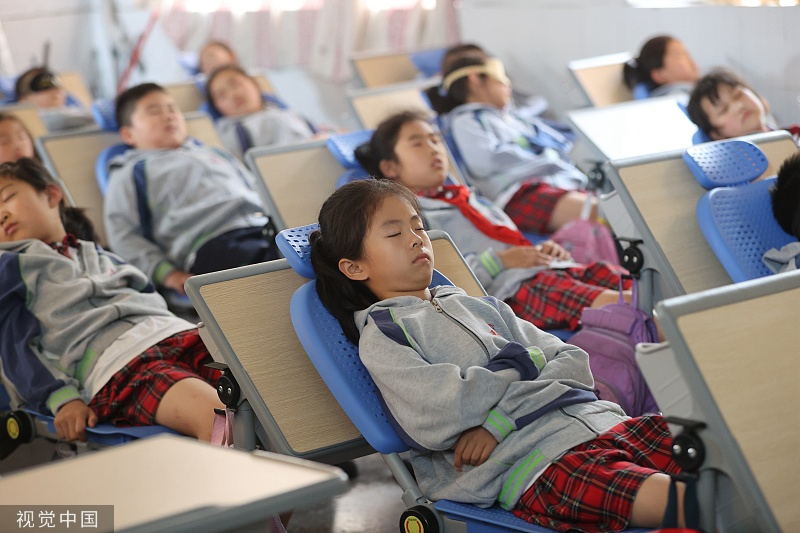Policies keep students rested
Schools begin to pay more attention to importance of naps, sufficient sleep


More than 21,000 primary school students in Handan now lie down for their noon nap, according to Xinhua News Agency. Zhang Hehong, director of Handan's education bureau, told China Education Daily that all urban students in Handan will be taking part in the new sleeping initiative within the next three years.
Xingfuhe Elementary School in Hangzhou, Zhejiang province, also won praise for letting its students sleep for an hour at noon in tents set up in spacious event rooms and libraries.
The school allows students to decorate their tents, make sleeping rules and name each tent, according to Qianjiang Evening News.
Zhou Hong, principal of the school, said that through the special sleeping initiative, the school encourages students to pay attention to sleeping and enjoy it. It also teaches them to be independent, given that they are in charge of their own tents, and to become accustomed to having their own space, she said.
"They have become more independent, which is an indispensable quality to teach students as they grow up."
The Ministry of Education has taken different measures to ensure that primary and secondary school students get enough daily sleep. In April 2021, the ministry issued a guideline to require primary school students to go to bed before 9:20 pm, middle school students before 10 pm and high school students before 11 pm, even if they did not finish their homework in time.
Primary school classes should start after 8:20 am and secondary school classes after 8 am. Schools should not ask students to come to school earlier than the time set for group study, and they should ensure a certain amount of nap time for students, the guideline said.
Schools also should limit the amount of homework so that primary school students are able to finish all written homework at school and secondary school students are able to finish most of it on campus, it said.
Lyu Yugang, director of the ministry's department of basic education, said in a survey of 77.14 million parents in December, 76.2 percent of respondents said their children were getting the recommended sleep of 10 hours every day for primary school students and nine hours for those in secondary school, up by 40 percent before the guideline was issued, Lyu said.
A total of 98.7 percent of schools have asked parents to monitor their children's sleep and study time, and 99.8 percent of primary and secondary schools banned students from bringing smartphones to classrooms, he said. Also, 96.1 percent of primary schools are starting classes at 8:20 am, and 97.4 percent of secondary schools are starting at 8 am or later.
"Homework, after-school tutoring courses and online games should all take second place to ensure students get sufficient sleep," Lyu said.
Jiang Fan, director of Shanghai Jiao Tong University School of Medicine's treatment center for children's sleeping disorders, said enough sleep has a significant impact on the physical, cognitive, psychological and mental growth of students, as well as their metabolic development.
Based on her team's research, short-term sleep deprivation and disorders can lead to a loss of concentration and a drop in school grades. Over the long term, such deprivation can lead to brain disorders, depression, anxiety and impulsive behaviors, while adding considerably to the risk of obesity and other metabolic diseases, she said.
Based on global data, about 25 percent of children and teenagers have or have had sleeping problems, and the main contributing factors include overuse of electronic devices and an excessive academic workload, Jiang said.
Schools, teachers, parents and students should improve their awareness of the importance of sleep and set up appropriate schedules for young students, she said.
While the ministry says primary school students should sleep 10 hours a day and middle school students nine hours, parents can adjust the amount of time their children sleep based on their own judgment.
They need to set a good example for their children by developing good sleeping habits themselves, and parents should also limit the time children spend on electronic devices, she said.
"More importantly, they should not add too much to students' academic workload or ask them to stay up late doing excessive academic tasks, which can harm their learning efficiency the next day and adversely affect the development of their brain and body."
Zhang Yu contributed to this story.
- Global elites gather for ice dragon boat championship in Xiliin Gol
- Fujian Coast Guard conduct patrols around Jinmen island
- Lantern fair opens in Nanning to celebrate Spring Festival
- Chinese scientists bring humanity closer to fusion reactor
- Sichuan doctor promotes TCM abroad
- Kunming mayor under probe for suspected discipline violations





































